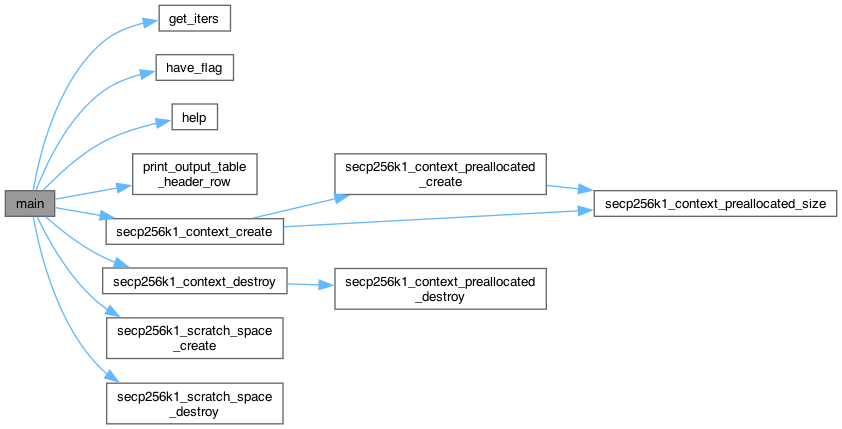Loading...
Searching...
No Matches
#include <stdio.h>#include "secp256k1.c"#include "../include/secp256k1.h"#include "util.h"#include "hash_impl.h"#include "field_impl.h"#include "group_impl.h"#include "scalar_impl.h"#include "ecmult_impl.h"#include "bench.h"
Include dependency graph for bench_ecmult.c:

Go to the source code of this file.
Classes | |
| struct | bench_data |
Macros | |
| #define | POINTS 32768 |
Functions | |
| void | help (char **argv) |
| int | main (int argc, char **argv) |
Macro Definition Documentation
◆ POINTS
| #define POINTS 32768 |
Definition at line 19 of file bench_ecmult.c.
Function Documentation
◆ help()
| void help | ( | char ** | argv | ) |
Definition at line 21 of file bench_ecmult.c.
21 {
34}
LOGGING_API void printf(Category category, const char *format,...)
Definition Logging.cpp:30
Here is the caller graph for this function:

◆ main()
| int main | ( | int | argc, |
| char ** | argv ) |
Definition at line 281 of file bench_ecmult.c.
281 {
282 bench_data data;
284 size_t scratch_size;
285
287
288 data.ecmult_multi = secp256k1_ecmult_multi_var;
289
290 if (argc > 1) {
295 return 0;
298 data.ecmult_multi = secp256k1_ecmult_pippenger_batch_single;
301 data.ecmult_multi = secp256k1_ecmult_strauss_batch_single;
304 } else {
307 return 1;
308 }
309 }
310
314 data.scratch = secp256k1_scratch_space_create(data.ctx, scratch_size);
315 } else {
316 data.scratch = NULL;
317 }
318
319 /* Allocate stuff */
326
327 /* Generate a set of scalars, and private/public keypairs. */
328 secp256k1_gej_set_ge(&data.pubkeys_gej[0], &secp256k1_ge_const_g);
329 secp256k1_scalar_set_int(&data.seckeys[0], 1);
331 generate_scalar(i, &data.scalars[i]);
332 if (i) {
333 secp256k1_gej_double_var(&data.pubkeys_gej[i], &data.pubkeys_gej[i - 1], NULL);
334 secp256k1_scalar_add(&data.seckeys[i], &data.seckeys[i - 1], &data.seckeys[i - 1]);
335 }
336 }
337 secp256k1_ge_set_all_gej_var(data.pubkeys, data.pubkeys_gej, POINTS);
338
339
341 /* Initialize offset1 and offset2 */
342 hash_into_offset(&data, 0);
343 run_ecmult_bench(&data, iters);
344
345 for (i = 1; i <= 8; ++i) {
346 run_ecmult_multi_bench(&data, i, 1, iters);
347 }
348
349 /* This is disabled with low count of iterations because the loop runs 77 times even with iters=1
350 * and the higher it goes the longer the computation takes(more points)
351 * So we don't run this benchmark with low iterations to prevent slow down */
352 if (iters > 2) {
354 for (i = 9; i <= 16; ++i) {
355 run_ecmult_multi_bench(&data, i << p, 1, iters);
356 }
357 }
358 }
359
360 if (data.scratch != NULL) {
361 secp256k1_scratch_space_destroy(data.ctx, data.scratch);
362 }
363 secp256k1_context_destroy(data.ctx);
364 free(data.scalars);
365 free(data.pubkeys);
366 free(data.pubkeys_gej);
367 free(data.seckeys);
368 free(data.output);
369 free(data.expected_output);
370
371 return(0);
372}
SECP256K1_API void secp256k1_context_destroy(secp256k1_context *ctx) SECP256K1_ARG_NONNULL(1)
Definition secp256k1.c:146
SECP256K1_API SECP256K1_WARN_UNUSED_RESULT secp256k1_scratch_space * secp256k1_scratch_space_create(const secp256k1_context *ctx, size_t size) SECP256K1_ARG_NONNULL(1)
Definition secp256k1.c:171
SECP256K1_API secp256k1_context * secp256k1_context_create(unsigned int flags) SECP256K1_WARN_UNUSED_RESULT
Definition secp256k1.c:107
SECP256K1_API void secp256k1_scratch_space_destroy(const secp256k1_context *ctx, secp256k1_scratch_space *scratch) SECP256K1_ARG_NONNULL(1)
Definition secp256k1.c:176
Definition bench_ecmult.c:36
Definition group.h:16
Definition group.h:28
Definition scalar_4x64.h:13
Here is the call graph for this function:
